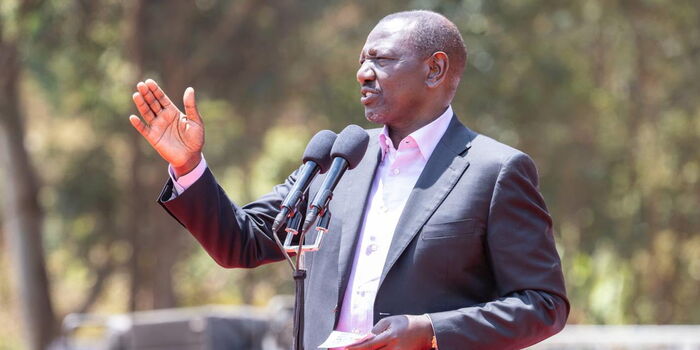President William Ruto has announced ambitious plans to create two major financial instruments aimed at funding national development without relying heavily on borrowing.
The proposed funds—a new Infrastructure Fund and a Sovereign Wealth Fund—are part of his broader strategy to strengthen Kenya’s economy and reduce the burden of public debt.
Speaking during a church service in Meru County on Sunday, October 5, President Ruto said he had already engaged all Members of Parliament, directing them to begin drafting legislation to establish the funds.
He stressed that the Infrastructure Fund would provide a structured way to finance large-scale public projects such as dams, energy expansion, and road networks, instead of depending on costly infrastructure bonds or commercial loans.
“I have spoken to all MPs to come up with two legislations, including an Infrastructure Fund to build dams. If it costs us Ksh600 billion, so be it,” Ruto said.
He added that while his administration had made progress over the last three years, the country needed to scale up its development ambitions.
“In the three years, we have laid the foundation. What we have done in three years is good, but not enough. We need to raise our standards. We have dealt with average for too long. It is time for us to elevate our game to take this country to the next level,” he noted.
Pushing Beyond Kenya’s Current Capacity
President Ruto emphasized that Kenya is currently operating below its true potential. He highlighted energy production as one of the biggest gaps the new fund would address.
“We need 10,000 megawatts of electricity. We only have 2,300 megawatts. We must move to the next level,” he said, signaling that a chunk of the infrastructure fund would go toward expanding the national power grid and energy projects.
Sovereign Wealth Fund to Manage State Assets
Ruto also said the Sovereign Wealth Fund would serve as a long-term investment vehicle, using proceeds from privatisation, state-owned enterprises, and monetisation of government assets. The goal is to channel this revenue into high-return development projects.
“The MPs have agreed with me. We have developed a privatisation programme and a monetisation programme so that we can change our country from a third world to a first world, like South Korea and Singapore,” he added.
This concept is not entirely new. A similar proposal was introduced in 2019 during President Uhuru Kenyatta’s administration. However, the Bill did not pass in Parliament at that time.
Focus on Local Projects and Reduced Borrowing
Ruto mentioned that several planned dam projects in Meru County would be among the earliest beneficiaries of the proposed infrastructure fund.
He underlined that the goal is to cut down on external borrowing by using targeted, sustainable financing options for national development.
His announcement came just as a delegation from the International Monetary Fund (IMF) arrived in Kenya for discussions with the government. The IMF team is expected to review the country’s debt sustainability, macroeconomic policies, and progress on reforms before approving any new financing arrangement.
Earlier this year, Central Bank Governor Kamau Thugge explained that the IMF would carry out a detailed assessment of Kenya’s financial and economic position to determine eligibility for a new support programme.
By pushing legislators to fast-track laws establishing the two funds, President Ruto is signaling a shift toward long-term, self-driven funding models to propel Kenya’s growth and reduce dependence on external lenders.
Join Government Official WhatsApp Channel To Stay Updated On time
https://whatsapp.com/channel/0029VaWT5gSGufImU8R0DO30


